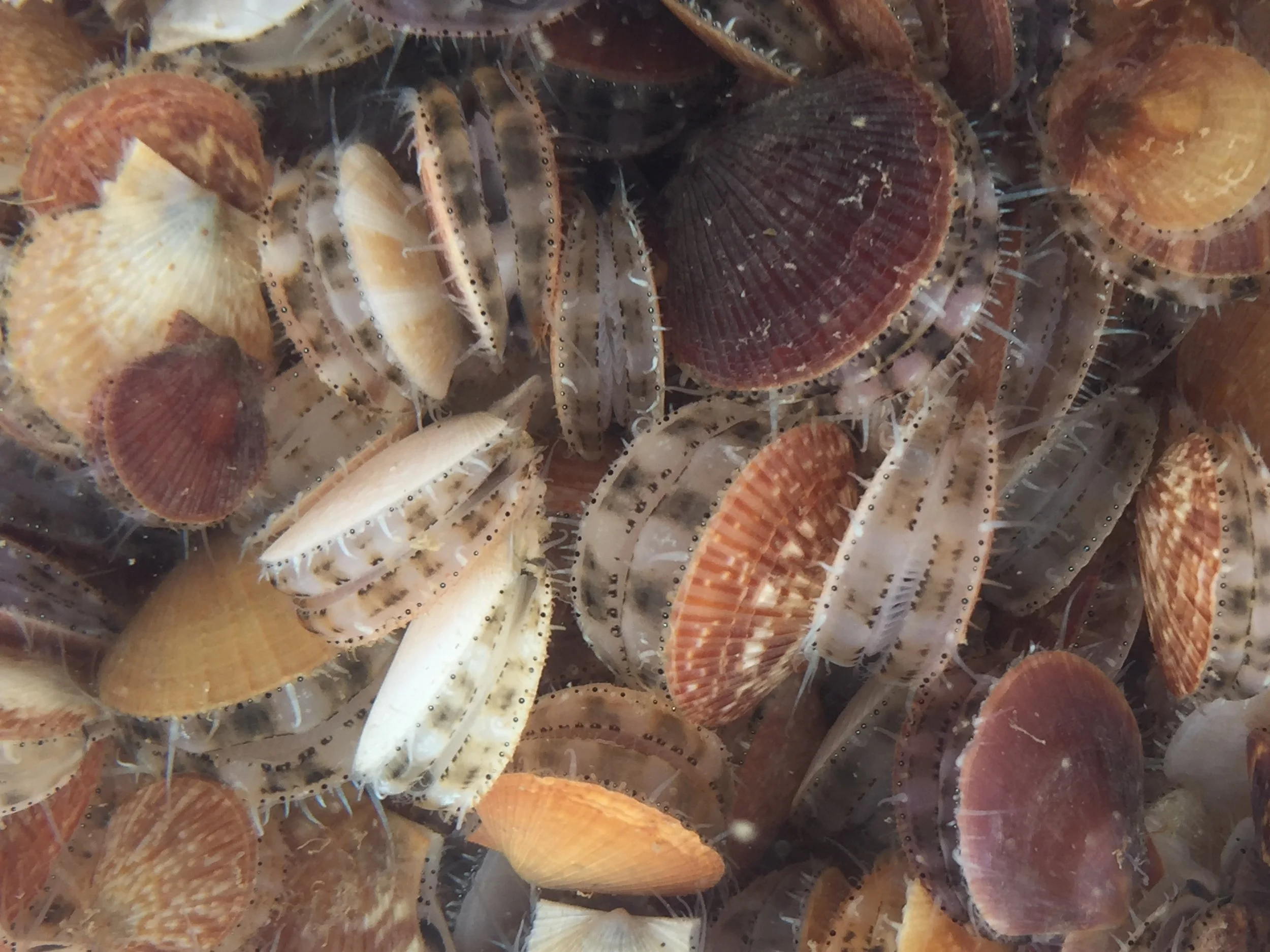Guest blog post by Research Assistant Jessie Batchelder
As an Environmental Studies major at Colby College, my recent alma matter, seniors are not required to complete a honors thesis in order to graduate. Up until the summer before my senior year, I had no intention of voluntarily undertaking such a daunting task - but that was before I spent a summer on Hurricane Island as the Research Intern working on the Maine Midcoast Collaborative Scallop Project. Throughout last summer, I become involved in all aspects of the research project including data collection, processing, and educating students and visitors about our research. With Cait’s encouragement, and the help of my advisor at Colby, I decided to tackle a small piece of this project as my senior honors thesis.
Placopecten magellanicus
My thesis focused specifically on Placopecten magellanicus “sea scallop” larval dynamics inside and outside the Lower Muscle Ridge closure area. Through my research, I aimed to answer the questions: has larval abundance changed over the three-year closure period and does it vary inside the closure area as compared to adjacent fished areas? The data I used to answer these questions came directly from the spat bags we deploy in the Muscle Ridge area as a metric to gauge larval abundance. Much of my summer last year was spent counting and measuring scallops from the spat bags, and it was exciting to take the next step in the research process by analyzing the data I had spent so much time collecting.
Completing my thesis was not easy work, and there were definitely times of frustration, but those were outweighed by the numerous positive moments and opportunities that came as a result of my thesis. As part of my work to understand current patterns in the Muscle Ridge Channel to determine likely directions of larval transport I interviewed scallop and lobster fishers from the Midcoast area about their perceptions of prevailing current patterns. Talking to the fishers and hearing their perspectives added a separate aspect to my project and exposed me to the world of social science research.
In April, I had the opportunity to present at the International Pectinid Workshop. This is an annual, international conference on all things regarding scallops. This year, it happened to take place in Portland, Maine, which made it easy for me to attend and present. IPW was the first scientific conference I had attended, and it was an incredible experience to hear from scientists across the world present their research on topics including fishery closures, gear modifications, management plans, scallop aquaculture, diseases and much more. Being at the conference also allowed me to interact and talk with senior researchers and graduate students which gave me a window into the many opportunities that are available should my interests remain within the scallop world.
Presenting my thesis at the Colby Liberal Arts Symposium (CLAS)
While the thesis experience as a whole was filled with challenges and rewards, the most fulfilling part of my thesis, (besides printing the final draft!) was presenting my work at the Colby Liberal Arts Symposium (CLAS), an annual event at the end of the spring semester when classes are cancelled and the entire day is dedicated to the research students from all years, majors, and disciplines have conducted during the past year. During the session devoted to Environmental Studies thesis presentations, I was able to talk about my work in front of peers, professors, roommates, friends, and family. This presentation allowed me to share my academic work outside of the research setting and communicate my research to friends who previously, only thought about scallops under the category of delicious seafood. CLAS is always a wonderful day filled with presentations, poster sessions, speech contests, music performances and art shows, and it was extremely rewarding to present my thesis and share my work with the greater Colby community.
Returning to Hurricane Island this summer as the Research Assistant has allowed me to continue working on the both the Midcoast Maine Collaborative Scallop Project as well as adding another year of data to my analysis. I’m excited to be back for a second summer to continue this work, be a part of the Hurricane community and enjoy all the benefits that stem from living on a beautiful island in Penobscot Bay!



